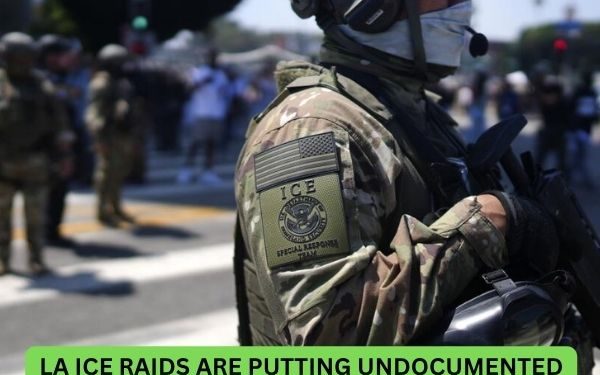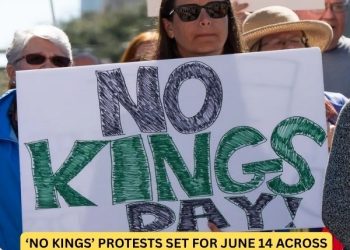On Monday, as ICE carried out sweeping raids across Los Angeles under President Donald Trump’s intensified efforts to deport undocumented immigrants, a client of the Survivor Justice Center was scheduled for a court hearing.
She was seeking a permanent five-year restraining order against her abuser, who had already violated a temporary one, according to Carmen McDonald, executive director of the organization that assists immigrant domestic violence survivors. The survivor had endured severe physical abuse, and the previous violation made the hearing critical for her safety.
But by Tuesday, the survivor had not shown up in court. Given her immigration status, previous concerns she voiced, ICE’s increasing presence at courthouses, and widespread raids across LA, McDonald and her staff believe she was likely too afraid to appear. By Thursday, the woman was still missing—“likely back with her abuser,” McDonald said. That scenario could be extremely dangerous: experts say survivors face heightened risk right after seeking protection or leaving an abusive partner.
“She literally had to choose between physical harm and potential ICE custody,” McDonald said. The woman had her own pathway to citizenship, separate from her abuser, but McDonald believes fear and the disruption of families kept her trapped in a harmful situation.
McDonald is one of several LA-area domestic violence service providers who say the ICE presence is deeply affecting both their work and the undocumented survivors they support. Although Trump has claimed to champion protections for women, advocates argue that aggressive immigration enforcement in LA and beyond is making it more dangerous for women and LGBTQ individuals—who face high rates of domestic abuse—by discouraging them from seeking help.
A recent shift in federal policy has added new challenges. ICE is now allowed to operate in and around domestic violence shelters and similar organizations—places that had previously been considered off-limits under Biden-era guidance. That change has worsened fears for survivors who were already coping with abusers threatening to call ICE or take their children as a form of control.
“When enforcement agents show up at courthouses and immigration raids are this broad, it creates a chilling effect,” said Connie Chung Joe, CEO of Asian Americans Advancing Justice Southern California. “Now victims are more afraid of being detained or separated from their children, and that fear can outweigh the need to protect themselves.”
The idea that ICE might enter a shelter is deeply alarming to local advocates. That concern became more immediate after the Trump administration withdrew Biden-era guidance that designated shelters and victim support centers as “protected spaces.” The revised rule now allows ICE to evaluate enforcement on a case-by-case basis—even inside these previously safe zones.
Cristina Velez, legal and policy director at ASISTA, a group focused on immigrant survivors, said the new guidance led to “a flood of concerns” from shelter organizations unsure how to safeguard everyone under their roof. Many LA service providers point out that their own staff also come from mixed-status families, making the anxiety personal as well as professional.
That fear seems justified. On Wednesday, LA City Councilmember Hugo Soto-Martinez shared a video on Instagram claiming ICE agents appeared at a confidential domestic violence shelter, reportedly looking for someone who wasn’t there. “How they found out this information, we don’t know,” he said. “These are supposed to be places of refuge for people escaping violence.” (Officials from ICE, Gov. Gavin Newsom’s office, and LA Mayor Karen Bass did not immediately respond to requests for comment.)
Chung Joe, McDonald, and other service providers report that calls from frightened survivors have surged over the past week. “Clients are calling in and asking, ‘Can I go to the doctor? To a Pride event? Can I take my kids to school?’” McDonald said. Of the roughly 1,000 survivors her group helps each year, about 70% are immigrants and over half are undocumented.
Another LA-area advocate, who asked to remain anonymous due to safety concerns, said: “Domestic violence programs and rape crisis centers should be sanctuaries. Now, we can’t even guarantee that.”
In response, many organizations have returned to pandemic-era protocols to minimize risk. One group serving South Asian survivors has gone fully remote since Monday. Others have temporarily closed walk-in locations. One left a note at the entrance directing survivors to a helpline and began discussing emergency plans with those in shelter—gathering documents, lining up safe contacts, and preparing for the worst. “We don’t know if ICE will walk in while someone’s waiting for an appointment,” one provider said.
Some clients have opted for virtual court appearances, fearing arrest if they show up in person. California courts don’t deport people and allow undocumented individuals to seek restraining orders and access family services. Many survivors also qualify for visas that offer legal protection. But in the face of mass deportations and ICE agents near courthouses, such rights can feel out of reach. “People would rather stay with their abuser than risk being detained or losing their kids,” Chung Joe said.
Some lawmakers are trying to respond. California State Senator Susan Rubio, herself a survivor, has introduced a bill that would ban immigration enforcement inside the private areas of shelters, rape crisis centers, and similar spaces unless agents have a court-issued warrant. “If fear keeps victims from walking through these doors, we’ve failed them,” Rubio said. The bill passed the Senate and is under review in the Assembly. Similar laws have been introduced in New York and signed in Maryland.
Casey Swegman, director of public policy at Tahirih Justice Center, welcomed these steps. “It’s encouraging to see states stepping up,” she said. “These laws give shelter staff a legal foundation to support their safety policies.”
At the federal level, Rep. Pramila Jayapal (D-Wash.) has reintroduced the WISE Act, which aims to expand protections for immigrant survivors—including banning enforcement at shelters and other sensitive spaces. “When ICE arrests survivors seeking help, it empowers abusers,” Jayapal said. “And it weakens public safety by making immigrant communities too afraid to report crimes.”
Still, advocates emphasize that proposed laws won’t ease the immediate fear engulfing survivors in LA and elsewhere. “Our clients are already afraid,” said McDonald. “Now they’re afraid at home and afraid out in the community.”
If you or someone you know is at risk of domestic violence, contact the National Domestic Violence Hotline by texting start to 88788, calling 800-799-SAFE (7233), or visiting their website. For immigration-related resources, visit the Alliance for Immigrant Survivors or check the California Partnership to End Domestic Violence directory.










